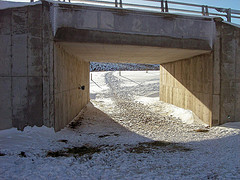How to Use the Wildlife Crossings Toolkit Library
The Wildlife Crossings Toolkit Library contains an annotated bibliography with a search function, and technical guides primarily useful for hard-surfaced highway issues. An image library with non-copyrighted images can be used for non-commercial purposes. Additionally, a library of peer-reviewed publications and syntheses on OHVs (Off-highway Vehicles) is in the section on OHV Library. Finally, for those people who have Endnote Library, primarily those in the USDA Forest Service, some peer-reviewed publications have bibliographic features.
Publications Search
The publications in the Wildlife Crossings Toolkit Library number well over 800 as of summer 2010, and this number will increase as new research documents are produced. You can use the search function to find publications of interest, along with summaries of the content. Due to copyright restrictions, these documents are not available on the Toolkit. However, if you or your agency has purchased access to the publication vendor, the URL will allow you access to the document. For example, the Forest Service has access to publications in Digitop and can access directly from the URL in the search. Most publications do not yet have the URL listed in the search return. We are working on ways to expand service to more agencies in the future.
Technical Guides
Many technical guides are available, although not all are electronic. This section will grow as guides are developed and as people request them.
Guide for FLMAs on transportation Programs and Planning
Guidebook Committee, . 2007. Federal Surface Transportation Programs and Transportation Planning for Federal Land Management Agencies--A Guidebook. 0777 1814P. San Dimas, CA: U.S. Department of Agriculture, Forest Service, San Dimas Technology and Development Center. 111 p.
The guidebook is designed to assist Federal land managers, staff, and partners in developing relationships and in maximizing participation in Federal Highway Administration (FHWA) and Federal Transit Administration (FTA) surface transportation programs. With the technical assistance available through the FHWA and the FTA, the agencies can help further regional and local community goals and better fulfill their mission including resource protection and environmental quality.
Federal Surface Transportation Programs and Transportation Planning For Federal Land Management Agencies—A Guidebook (pdf, 1.79 MB)
Wildlife Crossing Structure Handbook, Design and Evaluation in North America
This handbook provides numerous solutions to wildlife-vehicle interactions by offering effective and safe wildlife crossing examples. It initially describes the critter crossing problem and justifies the need to solve it. Project and program level considerations are identified for planning, placement and design of wildlife crossing structures. Key design and ecological criteria, construction and maintenance guidelines, and effective monitoring techniques are shown and described in this handbook’s practical application examples called Hot Sheets.
The report is available online from FHWA/Central Federal Lands Highways Program.
Wildlife Crossing Structure Handbook, Design and Evaluation in North America, Publication No. FHWA-CFL/TD-11-003, March 2011. Anthony P. Clevenger and Marcel P. Huijser.
Roadside Revegetation Using Native Plants
This guide is intended to support managers in facilitating successful protection and/or establishment of native vegetation as an integral part of road design and construction. This report summarizes the concepts and approaches developed in Roadside Revegetation: An Integrated Approach to Establishing Native Plants, from a manager’s perspective. While the full report is designed for field-level practitioners, it is this reference document that engineers and managers should use as a guide in project planning, design, and construction. This guide summarizes an integrated approach to effectively revegetating roadsides and other disturbance areas associated with road construction, modification, or obliteration. Management issues including scope, schedules, budgets, communication, and quality assurance are outlined as they relate to integrating revegetation practices.
By incorporating an integrated approach to revegetation into project management, the end product, the finished road, will be a better product. The driving public, partners, and other communities affected by road projects—including the plants, animals, and other forms of life—will be better served by this approach.
Managers Guide to Roadside Revegetation Using Native Plants (pdf, 3.35 MB)
Additional training and information is available online »
Roads Analysis
Image Library
Colleagues working in transportation ecology often give presentations to other professionals at conferences, training sessions and ‘brownbags’. Partners and friends of the Wildlife Crossings Toolkit have teamed up to create an image library of non-copyrighted images for non-commercial, educational purposes. The images in the Wildlife Crossings Toolkit image library are for you to use for helping others to understand impacts and solutions to tough transportation ecology challenges, as long as you attribute the images as indicated in the subject line and use them for non-commercial purposes. Please also give credit to the Wildlife Crossings Toolkit and use the URL here to assist others in finding useful information.
Images should be attributed as follows:
Image courtesy of ‘Name’ and USDA Forest Service Wildlife Crossings Toolkit (http://www.fs.fed.us/wildlifecrossings/)
Visit the Wildlife Crossings Toolkit Image Library »
OHV LIbrary
The OHV Library contains citations on off-highway, forest roads, roads, fragmentation, disturbance, and species habitat needs, where appropriate. The last literature search occurred on June 1, 2008; the last update occurred on June 9, 2008. Use the contact information on the left side of the page to request more information.
Page Last Modified: July 21, 2015

